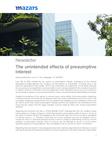
The unintended effects of presumptive interest
Law 788 of 2002 created the tax regime for presumptive interest, understood as the interest generated by debts between the company and the partner or shareholder. As these exist, a tax income is generated for the creditor, which may not be taken as a deduction for the debtor because this is a purely tax concept that is not accounted for and is not associated with the concept of payment or credit on account. Therefore, in the circumstances in which this phenomenon occurs, it is common for the parties to agree on a commercial interest in order to be able to take the deductibility of interest.
Despite the existence of this regime for several years, some effects of this presumptive interest go unnoticed and are only known by the taxpayer when the control authorities pronounce on them. Two unforeseen effects are analyzed here; the one related to the obligation of non-residents to file income tax returns when they receive presumptive interests and the one related to the contributions to the social security system that the Ugpp indicates must be made by those who receive presumptive interests.
Regarding the first point, the Dian, in Oficio 900298 of 2017 indicated that "the non-resident foreign natural person or foreign company or entity that perceives presumptive yields of loans in money of the article in mention will be in the obligation to file income tax return for the income that is considered of national source (...)". Therefore, those who are not tax residents and are not obliged to file an income tax return in Colombia because all their income is subject to withholding at source, but are creditors of presumptive interest, since no amount can be withheld at source on such income (precisely because it is presumptive), they are obliged to file an income tax return in Colombia.
Regarding the second point, many taxpayers have been receiving requirements to declare or correct their social security self-assessments due to the cross-checking of information that such entity makes with the Dian, and because they have fiscally declared as income -in their income tax returns- the presumptive interests. Based on this, the Ugpp has been interpreting and determining in some cases that such presumptive income, although purely fiscal (and unreal, from the monetary point of view) is an income "effectively received" and must be taken into account for the calculation of the contribution base of self-employed workers. In this sense, what was a purely fiscal presumption became a reality for the purposes of social security contributions, thus violating the very premise of "capacity to pay", which is the principle on which the obligation to contribute to the social security contribution system is based.


